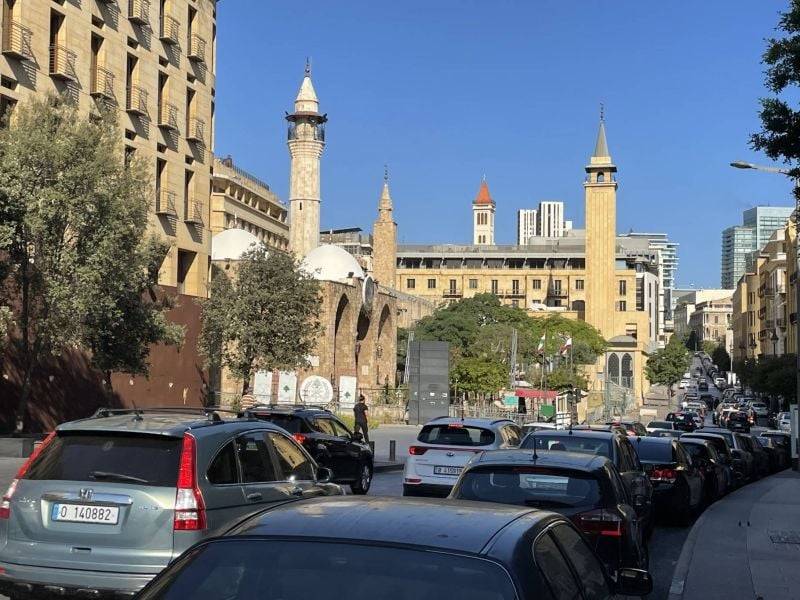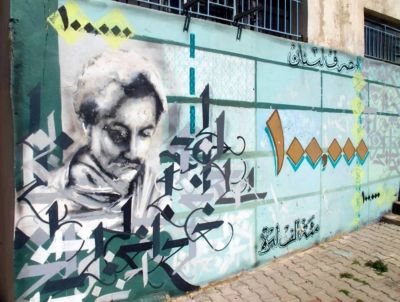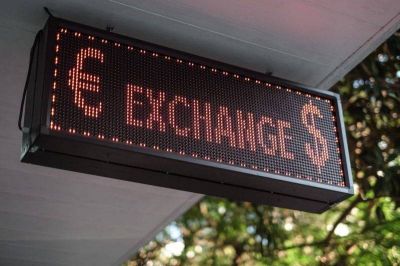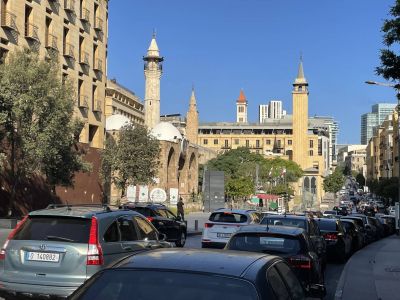
Weygand Street, one of the main access roads to downtown Beirut. (Credit: PHB)
Over the past few weeks, the four deputy-governors of Banque du Liban (BDL) led a rebellion to force the authorities to appoint a successor to Riad Salameh at the head of the central bank and to initiate a change in monetary policy in the very short term. This has taken the ruling class, the banks and public opinion by storm.
“It’s a dance on the edge of a precipice,” said the president of the Association of Lebanese Industrialists, Salim Zeenni, who criticized the cabinet’s irresponsibility and the deputy governors’ threat to resign.
Zeenni’s alarmist remarks are due to the fact that the deputy governors mobilized efforts at an already critical time for a Lebanese financial system in ruins, ahead of the departure of the man who shaped it over the past 30 years. They also come at a time when the monetary policy choices before and after the outbreak of the financial crisis in 2019 are being violently attacked by elements among both the public and the ruling class.
Several private sector representatives believe that the deputy governors, Wassim Mansouri, Bachir Yakzan, Salim Chahine and Alexandre Moradian, were right to call these choices into question.
But the timing of their mobilization and their strategy have not worked in their favor, even though some of the ruling class now seems more inclined to satisfy one of their demands: namely, to appoint a proper successor to Salameh one week before the end of his term of office, rather than extending his term or leaving BDL’s reins in their hands.
‘Dance on the edge of a precipice’
The general secretary of the Lebanese Economic Organizations and the president of the Beirut Traders Association, Nicolas Chammas, said “the deputy governors were right to open the debate, because the fundamental issues they are raising are part of a constructive approach. That said, they did not need to set this as a precondition for deciding whether or not to continue to work.”
He added that “the sinister situation facing the country is directly linked to the monetary policy problem, which has been in place for 30 years and has not been resolved.”
Zeeny believes that it is simply “unacceptable for such a serious issue to be addressed solely on the basis of political considerations, when it is the future of what remains of the Lebanese financial system that is at stake.”
The Association of Banks in Lebanon (ABL), which is very exposed to the potential shockwaves of decisions regarding the central bank’s leadership, refrained from commenting in detail on the situation.
“What matters to ABL is that the decisions taken by the authorities should protect the remaining bank deposits, and therefore the deposits of banks registered with BDL,” [several tens of billions of dollars that the institution’s foreign exchange reserves are far from being able to cover,] ABL’s secretary-general’s Fadi Khalaf told L’Orient-Le Jour.
“All solutions must focus on this objective,” he added.
Some bank directors talk more openly, albeit on condition of anonymity. Some believe that the deputy governors were right when they stirred up a hornets’ nest in order to be heard, and that the main thrust of the six-month strategy they proposed to float the exchange is unavoidable.
Others looked favorably on some of the recommended measures, in particular putting an end to BDL’s Sayrafa exchange platform and adopting by the end of August a capital control law that would legalize the banking restrictions imposed since 2019. However, the same people believe that the deputy governors cannot seek to shirk their responsibilities by abandoning their posts, at the risk of generating unprecedented chaos.
Can’t see the wood for the trees
No one in the private sector seems prepared to believe that there will be a vacuum in BDL’s governorship.
“If no progress is made by the cabinet to appoint a new governor, the vice-governors could resign, but in my opinion they will remain in their posts to handle day-to-day affairs,” said Chammas.
He added that the approach will give them the “moral endorsement” they are seeking for the next stage of events.
Zeenni meanwhile remarked, “No one can come and say: ‘Excuse me, but I am not working anymore.’ One has to maintain the continuity of the institutions, and that’s precisely why there are four vice-governors.” Zeenni believes that the possibility of all the vice-governors refusing to continue their job is simply unacceptable.
However, is there a risk that the prevailing vagueness on this issue could lead to a dramatic fall in the exchange rate, which has been hovering at a more or less stable level for some time (LL92,000 to the dollar; the pre-crisis rate was LL1507.5)? Those who agreed to answer this question did not rule out this risk, but commented on the topic from a broader angle.
“What is happening today is not rocket science: BDL is spending the dollars it holds or draws from the market to keep the exchange rate more or less stable. The question is whether to continue like this or to let the rate float. And the latter will change depending on how the transition is carried out,” said Zeenni.
“We should have let the exchange rate float from the start. The transition would have been brutal, but we would have squandered less [of the central bank’s] reserves in order to maintain the rate for an equivalent result,” he added.
In a strategy presented to the MPs last week, the deputy governors set out a six-month roadmap to enable the country to abandon Sayrafa, BDL’s current foreign exchange platform, the rate offered by which fluctuates sometimes close to, but always below, the market rate, to float the lira by relaying its rate via a new foreign exchange platform operated from abroad, and to boost the state’s tax revenues.
According to Chammas, the debate on changing the exchange rate platform is the tree that hides the forest, which refers to the choice of whether or not to inject foreign currency into the foreign exchange market.
“The country is faced with a bitter choice: contain the collapse of the exchange rate by drawing on its foreign exchange reserves, or stop draining depositors’ money and let the rate soar. This Cornelian dilemma has not been resolved, because it is one of the direct causes of the bankruptcy of the state and banks,” he said.
BDL, a key buyer of lira
“To sum up, the roots of the problem are financial and can only be resolved from that angle,” he added. It is a “colossal” project that will take several years to be completed and have far-reaching social consequences, he said.
It will have to start by resolving the distribution of losses issue and lead to a system where the state will no longer rely on the central bank for financing, which is one of the major recommendations of the International Monetary Fund (IMF), with which Lebanon has been engaged in negotiations since 2020.
Chammas also believes that the vice-governors’ strategy has several flaws. “It is already seeking parliamentary backing to lend the state $1.2 billion from foreign reserves to finance its operations during the six-month transition into a floating exchange rate system. However, there is a tendency in Parliament to oppose any solution of this type,” he said.
In their public statements, the MPs pointed to the need to protect what remains of bank deposits, but their opponents indicated that they have so far been reluctant to regulate the restrictions that the banks have been illegally imposing on depositors since 2019.
Chammas said, “Secondly, it is a pipe dream to believe that the lira exchange rate against US dollar can be regulated after six months simply by the interplay of supply and demand on the new platform, even by forcing businesses to accept only payments in lira, as recommended in the deputy governors’ strategy.”
He added that BDL remains the only “market maker” in the face of growing demand for foreign currency by Lebanese agents, and other countries in the region, including Syria.
“Even the best platform without the injection of dollars will fail, and the worst platform with an injection of dollars will be able to do the job in the current situation,” he said. He nonetheless praised “without reservation” the efforts of the deputy governors to improve the governance and transparency of the platform to which the Lebanese market will refer.
This article was originally published in French in L'Orient-Le Jour. Translation by Joelle El Khoury.



